An information and debrief session regarding the International Exchange Program of Tokyo Tech's three Schools — the School of Engineering, School of Materials and Chemical Technology, and School of Environmental and Society — was held on November 7, 2018.
In the first half of the session, Associate Professor Jiro Takemura, Chair of the International Exchange Committee affiliated to these three Schools, explained the overview of the program and the requirements and procedures for the next application, while Specially Appointed Professor Eri Ota introduced the Global Scientists and Engineers Course (GSEC).
In the latter half of the session, students who participated in the program this summer made presentations about their study abroad.
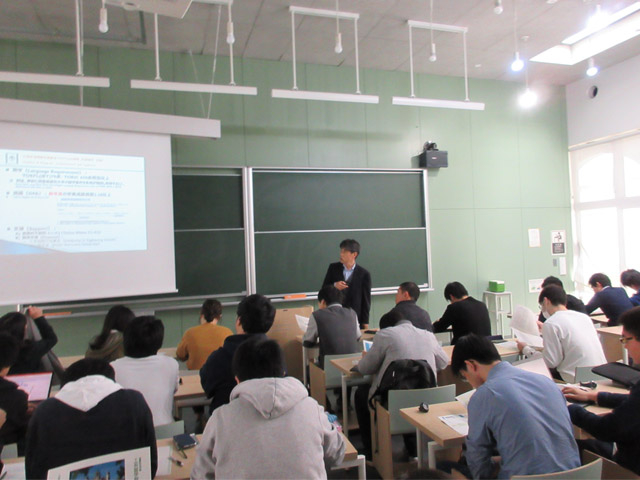
Opening remarks and program guidance by Assoc.
Prof. Takemura
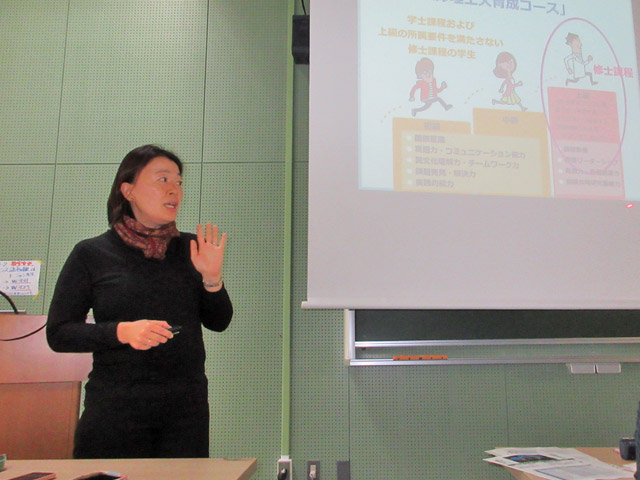
Specially Appointed Prof. Ota
introducing Global Scientists and Engineers Course (GSEC)
The eleven presenters and their host universities are as follows.
Host University |
Presenter |
Period of Study |
Imperial College London (UK) |
Nao Koishihara, 1st-year master's student, Materials Science and Engineering |
Aug. - Oct. 2018 |
University of California, Santa Barbara (UCSB) (US) |
Peng Zugui, 1st-year master's student, Mechanical Engineering
Takumi Uchiyama, 1st-year master's student, Materials Science and Engineering |
June - Aug. 2018
June - Sep. 2018 |
RWTH Aachen University (Germany) |
Yopi Prabowo Oktiovan, 1st-year master's student, Architecture and Building Engineering |
June - Sep. 2018 |
University of Oxford (UK) |
Hiroaki Matsuda, 1st-year master's student, Materials Science and Engineering
Yutaro Fujisawa, 1st-year master's student, Materials Science and Engineering |
July - Sep. 2018
July - Sep. 2018 |
Tsinghua University (China) |
Estu Dong, 1st-year master's student, Materials Science and Engineering |
June - Sep., 2018 |
Nanyang Technological University (NTU) (Singapore) |
Kana Ishisone, 1st-year master's student, Materials Science and Engineering
Yuta Nishizaki, 2nd-year master's student, Materials Science and Engineering |
June - Sep., 2018
July - Sep., 2018 |
Georgia Institute of Technology (US) |
Riku Funada, 3rd-year doctoral student, Systems and Control Engineering |
June – Nov., 2018 |
City University of Hong Kong (China) |
Amanda Ahl, 2nd-year doctoral student, Innovation Science |
Aug. - Oct., 2018 |
During the debrief session, participating students made presentations about their study abroad in English.
Testimonials from participating students
Nao Koishihara studying at Imperial College London
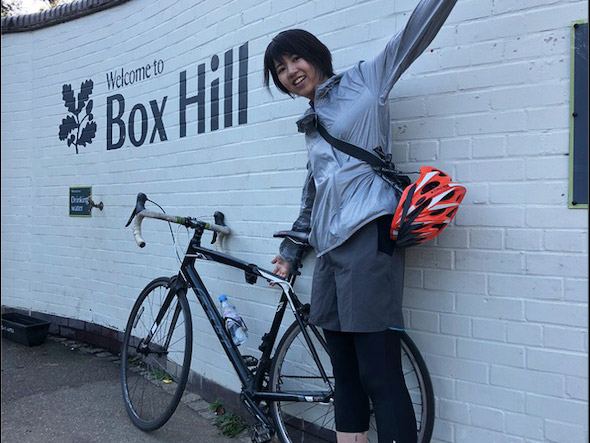
Koishihara cycling with lab members outside London
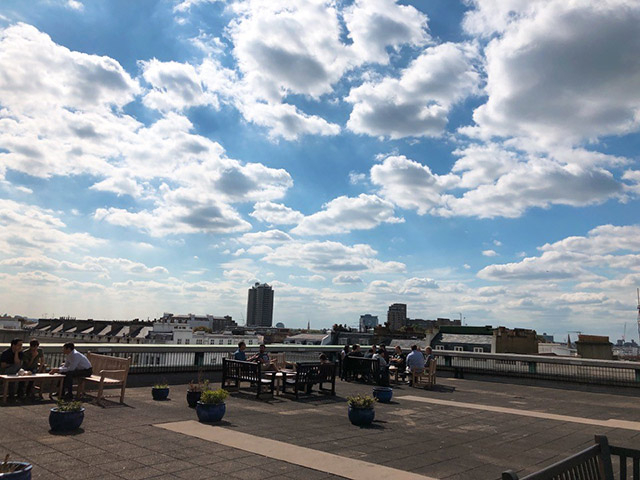
Lab members on break on the roof
Having experienced study abroad for two and half months in my third year of undergraduate studies, I didn't feel uneasy about my life overseas and making conversation in English, but I had to arrange my flight and accommodation, and negotiate research details by myself for the first time. There were also many challenges I had to go through, such as familiarizing myself with the lab and the way of doing research, and how to spend my weekends. There being few Japanese, it was essential for me to speak English in order to appeal to the people around me, which was obviously a great chance to grow. It was exciting to cultivate a friendly relationship with people, sharing joys and sorrows with lab members of various backgrounds. Overcoming difficulties one by one gave me confidence.
If you are doubtful about whether to study abroad or not, I would say you should! Even though you are not confident with your English ability, as long as you have some expertise, you will be able to communicate.
Peng Zugui studying at UCSB
In all honesty, I set about studying abroad without being well prepared physically or mentally. However, in retrospect, my choice to participate in this program was great.
My most notable achievement was gaining self-confidence. Before the program, I had vaguely averted my eyes from English, which I was not good at, but plunging into an English speaking country, I had to somehow survive using it. At first, I was anxious and impatient with my circumstances and disliked that I always troubled people around me. However, I persuaded myself that "every single challenge is the process of growing myself" and tried to have a positive attitude on everything. Then, what I thought would be impossible worked out unexpectedly, which gave me confidence. This precious experience will surely have a major impact on my thinking and I believe I will overcome difficulties with assurance.
Also, I reaffirmed the joy of research. I was in an environment in which I could concentrate on my research for two months without lectures and miscellaneous duties. The more I did an experiment, the more I found something unclear, and in order to solve that, I repeatedly pondered a process I really felt satisfied with. Not only faculty members but students were seriously engaged in research, and talking with them provided me with new insight.
My English ability is still fair to middling now, but made rapid progress during the two months compared to before the program. The happiest thing was when my joke set the audience off into a fit of laughter in my final presentation. That kind of pleasant experience will be a great motivator to English learning in my future.
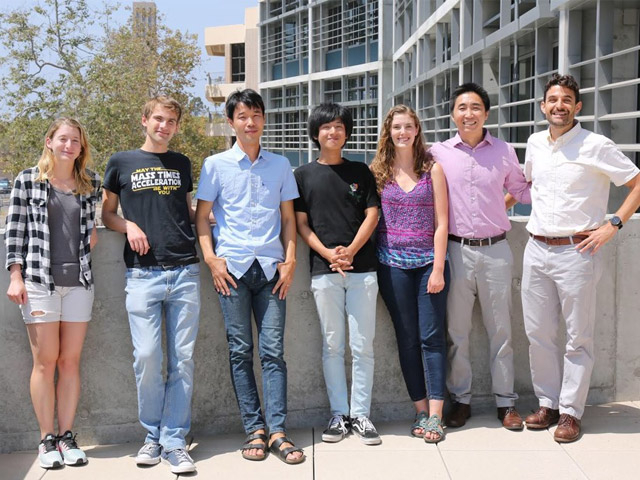
Zugui (center) with lab members,
Host Professor Omar Saleh (far right)
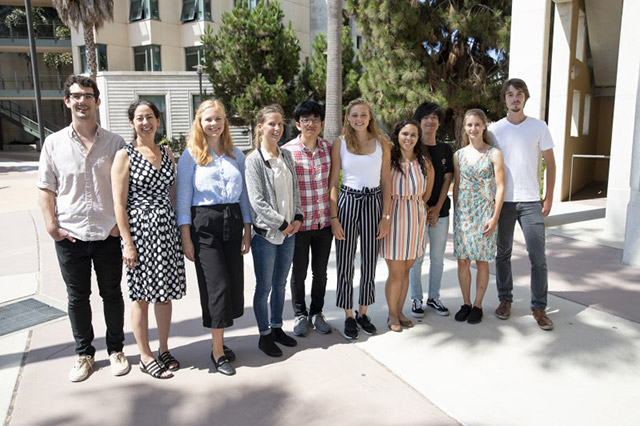
Zugui (3rd from right) and Uchiyama (center)
with Cooperative International Science
and Engineering Internships members
Takumi Uchiyama studying at UCSB
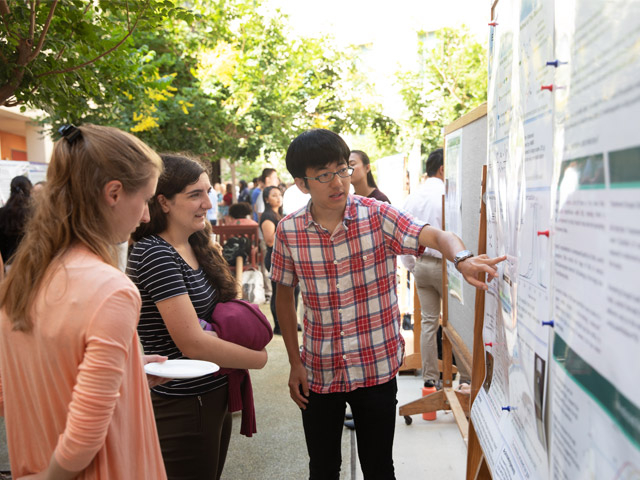
Uchiyama (right) at poster session
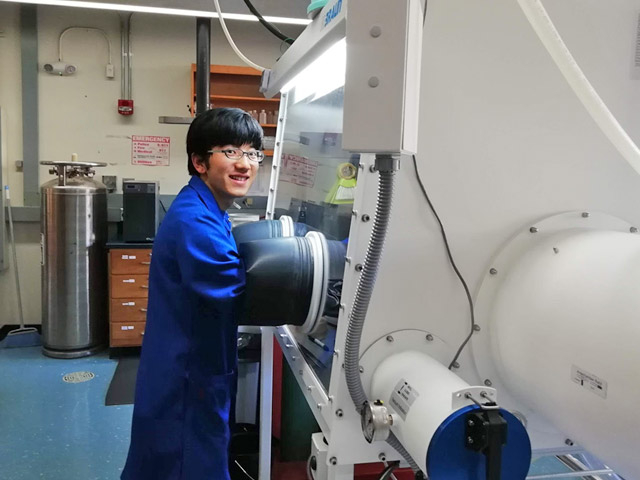
Uchiyama at lab
In this program, I aimed at polymer synthesis by polymerization method, which I usually don't conduct in my lab at Tokyo Tech. At first, there were many concerns about unfamiliar surroundings, such as lab, machinery, research content, culture, and customs, but I overcame them one by one, which finally became a precious experience I could only gain overseas. Through this experience, I obtained confidence in myself.
In the department, there were no Japanese students, but three Japanese post-doctoral and visiting researchers, two of whom were Tokyo Tech graduates, were coming. I joined the community and listened to those who are successful on a global scale, which will pay off for the rest of my life. In private, I spent time with the members of the program and lab. The program members came from various countries and wore their nationalities on their sleeves, which was a fresh and multihued experience for me.
Yopi Prabowo Oktiovan studying at RWTH Aachen University
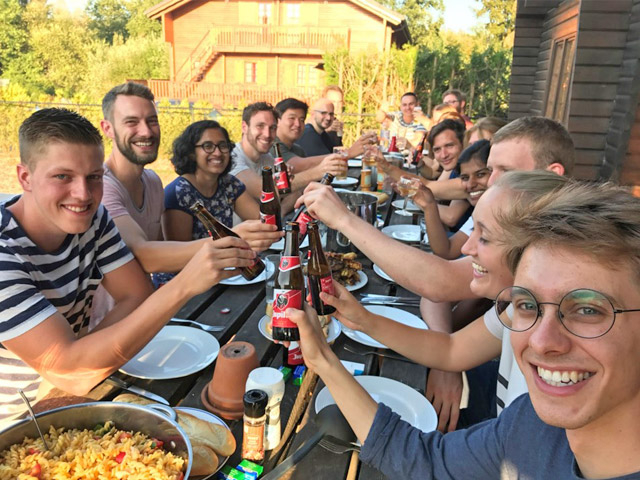
Oktiovan (5th from left) with lab members
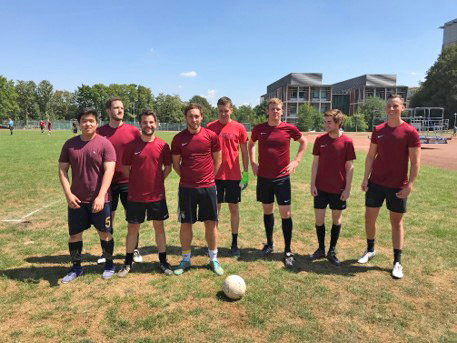
Oktiovan (far left) and football club members
The research topic that I focused on RWTH Aachen was scaled boundary isogeometric analysis. In general, isogeometric analysis is the novel finite element method that utilizes the flexibility of NURBS (Non-Uniform Rational B-Spline) control points as "nodes" in the finite element realm.
As for my accommodation, I asked for some help from the Indonesian Student Association in Aachen since the accommodation provided by the university was fully booked by the time I arrived at Aachen.
My message for the next students is to be prepared to learn German before departing to Aachen as most of the elders and staff workers do not speak English. Try to learn a couple of German words and conversations in order to catch up with the other lab student members. I also enjoyed participating in the Civil Engineering Football Championship and the excursion to Durbuy, Belgium in my spare time.
Hiroaki Matsuda studying at University of Oxford
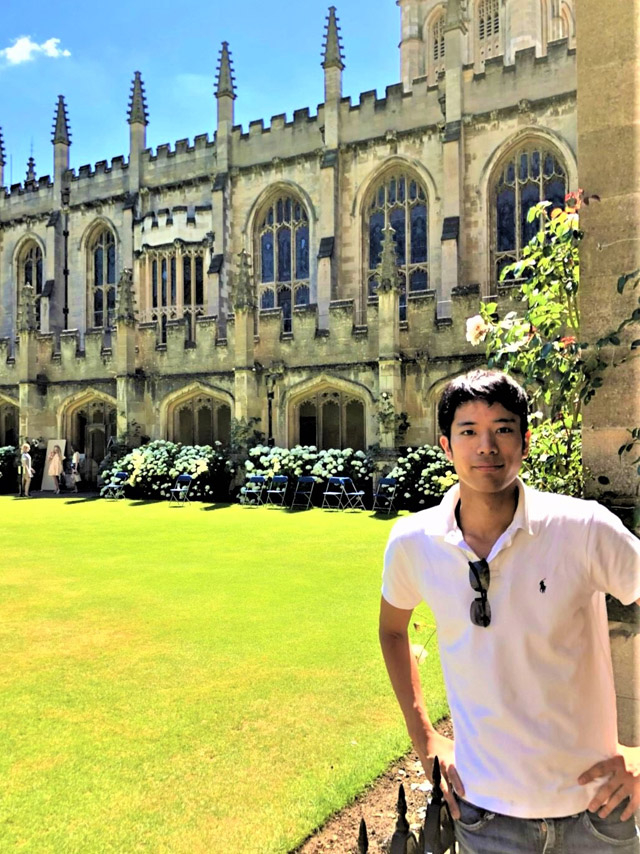
Matsuda in front of Christ Church
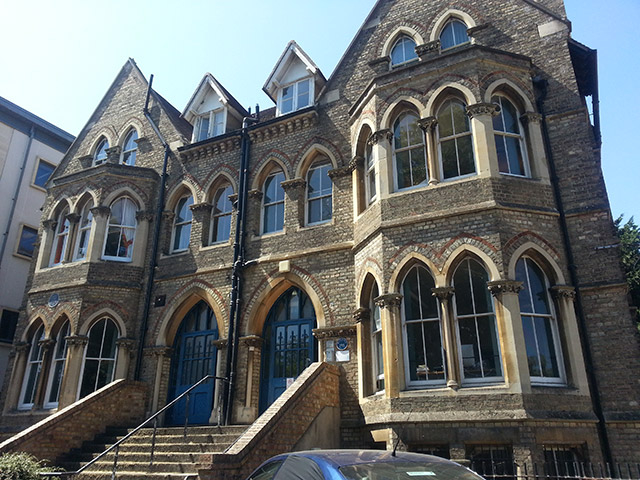
Exterior of the lab at Oxford
The lab I belonged to deals with nanomaterials, mainly with graphene. The atmosphere was solemn and 20 students, researchers, and technicians were affiliated, most of whom were diligent Chinese members. As a result of this program I was able to experience campus life of graduate students in a foreign country, improve my English ability, communicate more precisely, and especially, learn deeply about the University of Oxford. The university had a great environment for improving myself, and students from all over the world, notably the PhD students, were aspiring and mature in terms of personality and ability. The local students had a very strong image of their future, showed interest in even their extra-professional fields, and tried to do their best at all times. I rarely have a chance to be around such people so it was very thought provoking. It made me realize that if you always try to think and act positively, your study abroad life, or even life itself, will be meaningful and fun for sure.
Yutaro Fujisawa studying at University of Oxford
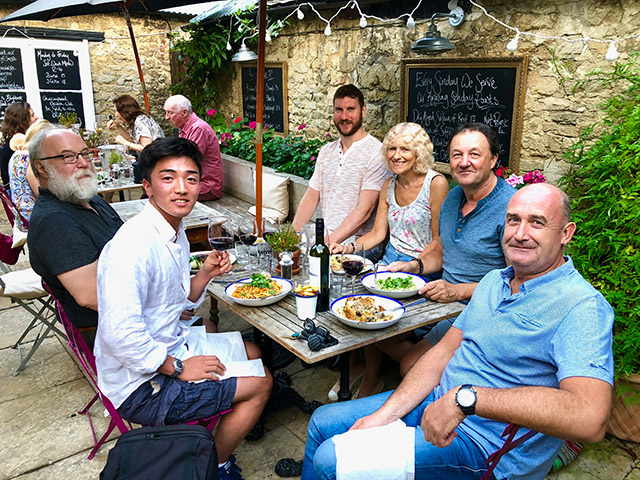
Fujisawa (left) with project members at dinner
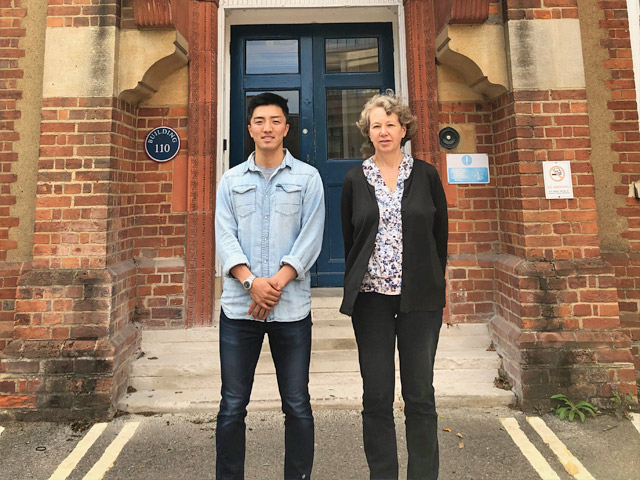
Fujisawa (left) with Host Professor Keyna O'Reilly
The lab I belonged to has been carrying out joint research with local companies for over 30 years and I was in charge of some experiments at N-tech located in Oxford. I made two experiments, both of which were commissioned by a local material manufacturer. One was a big project, so I was in charge of a part of the project, making experiments and analyses using a direct chill casting simulator. I held discussions about its performance estimate with our team members based upon the results. I was also the main person in charge of the other project and improved the device's productivity, having many discussions with technicians. I do research on magnetic thin film at Tokyo Tech and the topic of metal solidification was new to me, but I managed to overcome the difficulties thanks to support from PhD students of the lab.
Having been overseas to study twice before this research abroad program, I didn't have any inconveniences with daily conversations in English. However, I couldn't enter group communication well and initially felt difficulties in team discussions. Still, conducting research in a team environment and living communally in college were valuable experiences. If you are interested in studying abroad, you should try regardless of your language ability.
Estu Dong studying at Tsinghua University
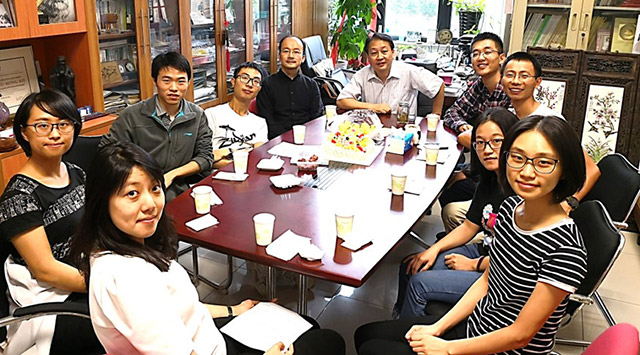
Dong (2nd from left) and lab members, Host Professor Xu-Ming Xie (5th from right)
It was a great experience for me to live in the capital of a great country like China. I gained substantial firsthand experiences of the local atmosphere in a uniquely two-faced period when rapid growth and innovation as well as a stable life coexist. I lived in town with pals of my age, who are from my university. That must have been rare for this program, even with its long history. I tried to interact actively both on and off campus. Thanks to financial support from my parents, I had money to spend on life experiences and I can say with confidence that I gained great firsthand experiences.
This abroad program was just three months so "once over the border, one should try anything." I didn't feel anxious at all about my language ability. You can communicate using just a few words with locals. I recommend that students who study abroad not only experience things as the locals do, but also take in the astonishment and happenings that you have a hard time believing. If you want to engage in discussion deeply with people off campus, it is obviously essential to speak the local language.
Kana Ishisone studying at NTU Singapore
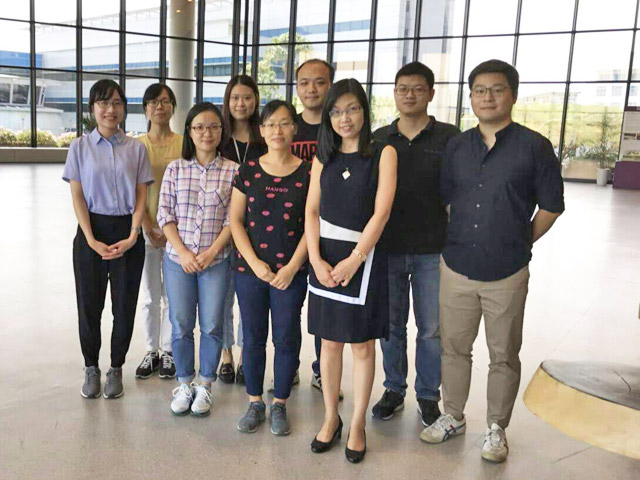
Ishisone (far left) and lab members,
Host Professor Xu Rong (far right, 1st row)
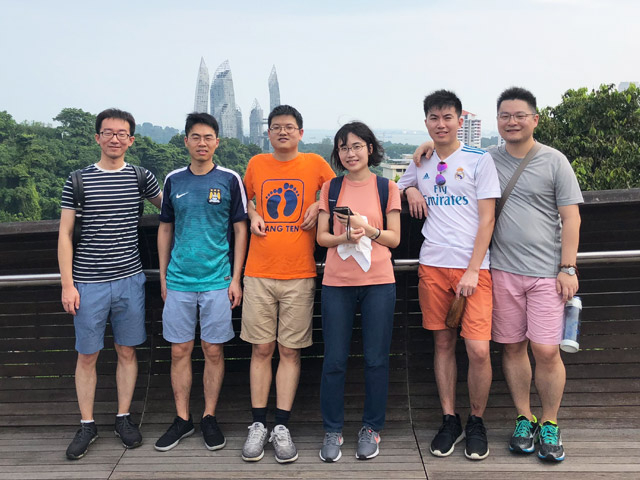
Ishisone (3rd from right) and lab members on a sightseeing trip
According to seniors who have studied abroad for three months, it is difficult to complete one's research in such a short time. It is also important to set goals other than research, so I decided to communicate with people from diverse backgrounds. There are overseas students at Tokyo Tech and chances to talk to them, but the environment is still very Japanese. Looking around, there are indeed Japanese people everywhere and we can ask for help if there is a pause in the talk. Getting close with foreigners in Japan is only a small change in a familiar environment. Needless to say, in Singapore there were no Japanese people around. Consequently, there was no chance to speak my mother tongue, no acquaintances, and no one I could depend on. I fumbled at first. In such a situation, I was delighted to be able to make friends in English. Honestly, in the first month, I often felt lonely as my lab members were all Chinese and they were very tied to each other. In the hostel, the residents were all Malay who went to the same school. It seemed to be the first time for most of them to talk with a Japanese person in real life, so they must have been unsure how to communicate with me even though I am also Asian. Compared to westerners, Asians look much shyer and less eager to talk to strangers. I was in a new situation and perplexed at first. However, I tirelessly struck up a conversation with them, and they started to welcome me in delight. Once we became friends, they showed me great kindness. I believe I could not have experienced something like this only living in Japan or a place with many Japanese living or studying. NTU has few Japanese students and is located far from the center of the city, so I would say it was an advantage to choose Singapore and NTU to interact with many Asian students, particularly since Asia's future looks bright not only economically but also academically.
Yuta Nishizaki studying at NTU Singapore
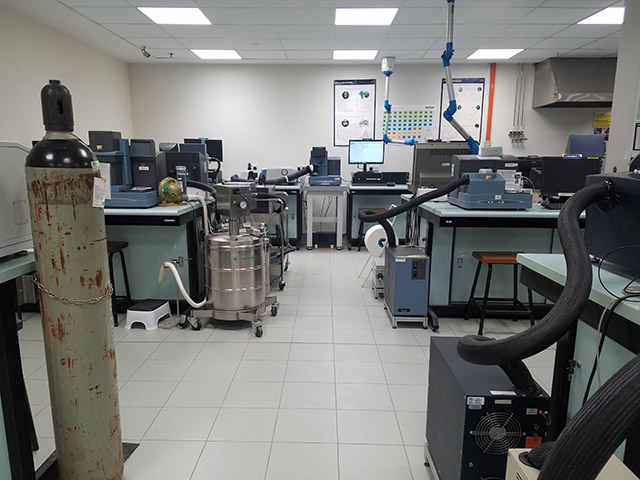
Nishizaki's host lab
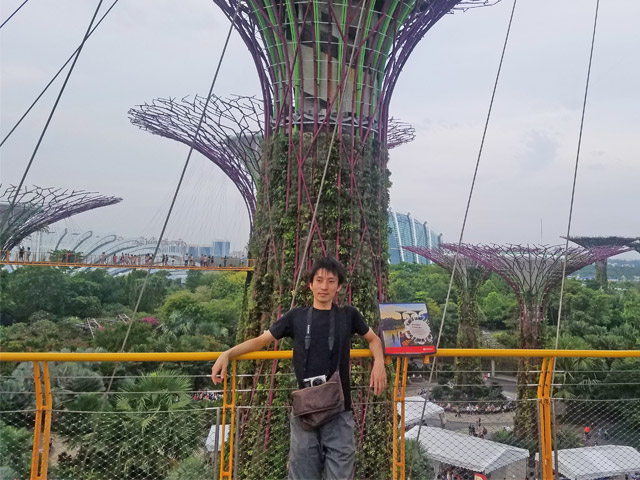
Nishizaki at Gardens by the Bay
I realistically felt that the wave of globalization of this world was beyond my expectations through my Singapore life. I have been overseas before and even while in Japan I noticed that more and more foreigners were coming to Japan, but what I saw as an exchange student was totally different. Nowadays, every country is competing with each other on an equal footing and making the world better. During my stay, I often talked with friends who came from China and what I heard from them was so intriguing it made me want to study Chinese.
There are various peoples living in Singapore. It is a just small island, but so economically successful. It was so impressive for me that it felt like “an art of a country.” However, I learned that there are also negative aspects in parallel.
Even though I faced troubles or tough moments during this stay, in retrospect, I think that I led a really happy life from the bottom of my heart. When I decided to go to Professor Yu’s group, I was a little bit nervous because their research fields were slightly different from mine at Tokyo Tech. However, I feel that my having jumped into this challenge was really the correct thing to do.
Riku Funada studying at Georgia Tech
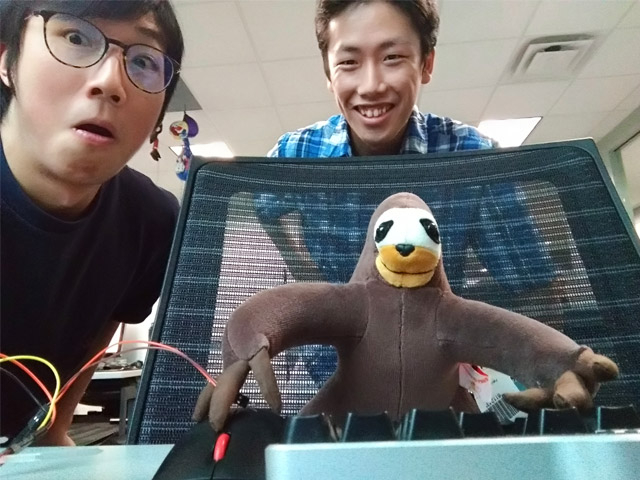
Funada (right) and lab member
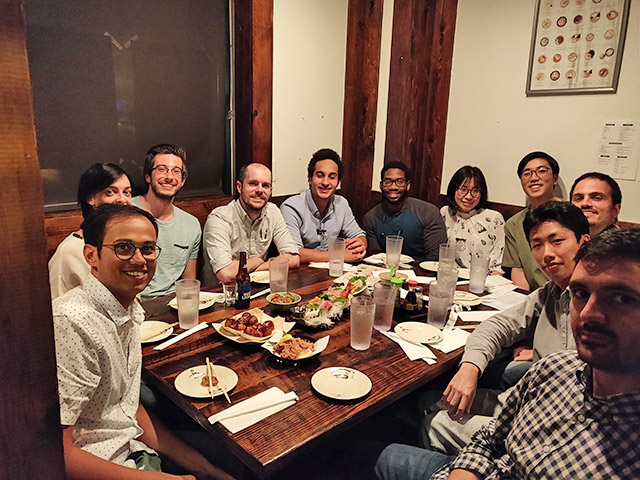
Funada (2nd from right) and lab members
The lab I belonged to was active in the front lines of system control engineering, such as research that accomplishes the control of an object by coordinating plural robots, and my host professor was a distinguished academic. I was accepted as a visiting scholar there. I went to study abroad during my third year of doctoral studies, which was late and I was approaching my graduation. There were both good and bad aspects to studying abroad at that time. First, it was very fruitful to experience research before graduation in a completely different environment from where I did my previous studies. Whether I choose a university or a company as the next step in my career, I will likely have to conduct different research in different circumstances after graduating. This was good practice, and achieving a certain result increased my self-confidence. On the flip side, I wish I had learned about the research methods and environments of foreign countries much earlier. I would have utilized that knowledge in my future career plans.
Amanda Ahl studying at City University of Hong Kong
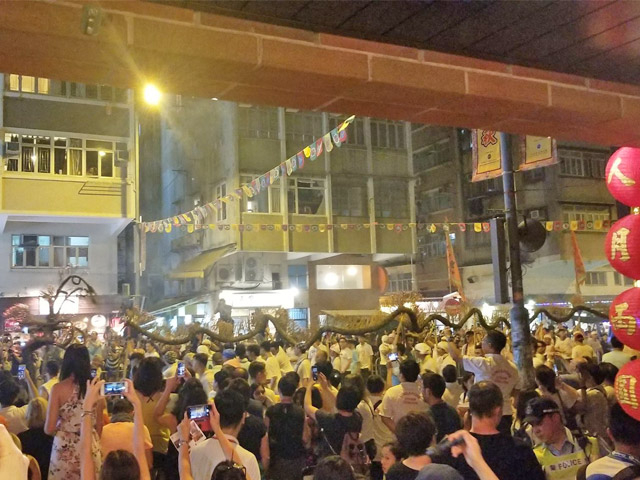
At Hong Kong Dragon Festival
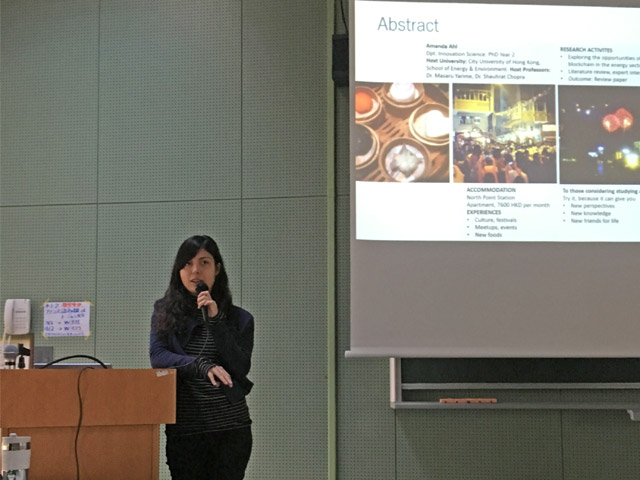
Ahl at debrief session
Outcomes from my time studying abroad in Hong Kong were very positive. I could make progress with my research, learn from various new perspectives and discussions, and experience a new culture and way of living. In addition, I believe I also made great contacts and friends for the future. My main message to those considering studying abroad is that you should definitely try it as it can enable you to meet new people, learn many new things, and open your mind. It's a great opportunity.
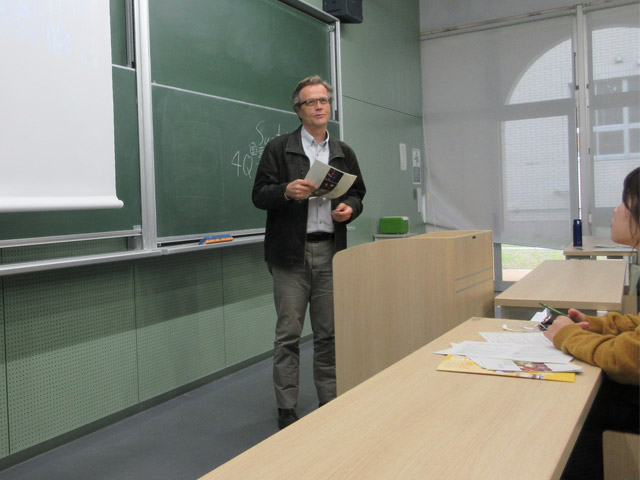
Closing remarks by Professor Martin Vacha,
faculty member of the International Exchange Committee
This information and debrief session was an opportunity to promote better understanding of the tree Schools' International Exchange Program, and to access fresh local information through testimonials provided by participants who had just returned to Japan. The summer continues to be the most popular study abroad period for Tokyo Tech students because it allows them to adjust their academic schedules effectively and join prestigious partner institutions in the US and Europe.
. Any information published on this site will be valid in relation to Science Tokyo.





























